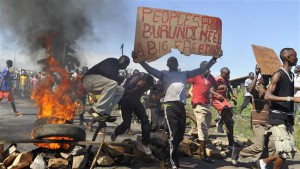The good news is that the killing in Burundi has not yet grown into a civil war like the one that killed 300,000 people in 1993-2005, let alone a genocide like the one that killed 800,000 people in neighbouring Rwanda in 1994. The bad news is that Burundi is getting there.
It’s hard to speak well of Sepp Blatter, the disgraced former head of Fifa, the international football federation. But Africa would owe him a large debt of gratitude if he had persuaded Burundi’s President Pierre Nkurunziza not to seek a third term, and instead to accept a job as FIFA’s “ambassador for football” to the world.
When the story came out recently in Blatter’s autobiography, the Swiss foreign ministry (which asked Blatter to make the offer) explained that “The intention was to contribute to a peaceful solution in order to prevent the current crisis in Burundi.”
It might even have worked. Nkurunziza is a keen footballer, and he certainly has put aside enough money to retire on. But he chose to stay on and run for a third term, and started Burundi on the road back down to Hell.
African presidents suffer from two besetting sins. One is the belief that they are irreplaceable: almost two-thirds of African countries had two-term presidential limits in their constitutions by 2000, but since then ten of them have seen attempts by their presidents to remove the limit. The most recent was Rwanda, where President Paul Kagame’s last permitted term will now end in 2034.
But Pierre Nkurunziza’s excuse was particularly pathetic. He became president at the end of the civil war in 2005, when the peace was precarious. There was no time for a presidential election, so he was elected to the presidency by a parliamentary vote.
On the basis of that, Nkurunziza began claiming last year that his first term shouldn’t count towards his constitutional two-term limit because he was chosen by parliament and not by the people. Even Zimbabwe’s President Robert Mugabe (seven terms and counting) saw the humour in that. “They say the first term was not a real term,” he said at an African Union summit last June, “but you were there for five years!”
Burundi’s Constitutional Court accepted Nkuruniza’s claim, however, as it would have been hazardous to the members’ health to do otherwise. (One of the judges then fled the country, saying that they had all been bullied and threatened into giving that judgement.) The opposition parties all boycotted the election last July, so Nkurunziza “won” – and by then the level of violence was rising rapidly.
The killing started after a failed military coup that tried to stop the sham election, and the reported death toll is now around 400. The known victims are mostly political activists and ordinary citizens murdered by the police in Bujumbura, the capital, but the real total of the killings must be far higher. Rural killings are rarely reported, but a quarter-million people have fled the country in the past year and now live in refugee camps in neighbouring countries.
The one consolation in this dreadful situation until recently was that it wasn’t a tribal confrontation. In both Rwanda’s genocide and Burundi’s civil war the majority Hutus (85 per cent of the population) were on one side and formerly dominant Tutsi minority on the other. Since the civil war, however, Burundi’s army has been evenly divided between the two ethnic groups, and the opposition groups have also included both Hutus and Tutsis.
The other besetting sin of African presidents, unfortunately, is that if they come from the biggest tribe (as they most often do), when they get into deep political trouble their default solution is to fall back on tribal loyalties. That is what Nkurunziza is doing now. The army is being purged of Tutsis, and the very same language used by the Hutus in the run-up to the Rwanda genocide is now being used by Nkurunziza’s Hutu backers in Burundi.
Révérien Ndikuriyo, the president of the Burundian senate, has been referring to the regime’s opponents as “cockroaches” (the same word used for Tutsis by the Hutu extremists in Rwanda). He has even called on the government’s supporters to “start work” (“kora”), which was the code-word used in Rwanda for the launch of the 1994 genocide.
Nkurunziza is trying to turn a political confrontation he might lose into an ethnic conflict that he could win, but the cost would be another genocide. The future of an entire country of ten million people is being put at risk by his personal ambition.
The African Union offered to send 5,000 soldiers to help quell the violence, but backed down when Nkurunziza objected. There are 19,000 United Nations peacekeepers just across the border in the Democratic Republic of Congo, but the political will to send them in is lacking.
So far the opposition parties (which are, of course, mostly Hutu) are resisting Nkurunziza’s attempts to scapegoat the Tutsis, but in the world’s poorest country many ordinary Hutus will be tempted to go along with the regime’s lies in order to steal their Tutsi neighbours’ land. We may be weeks away from Africa’s next genocide.
cyprus-mail.com/



